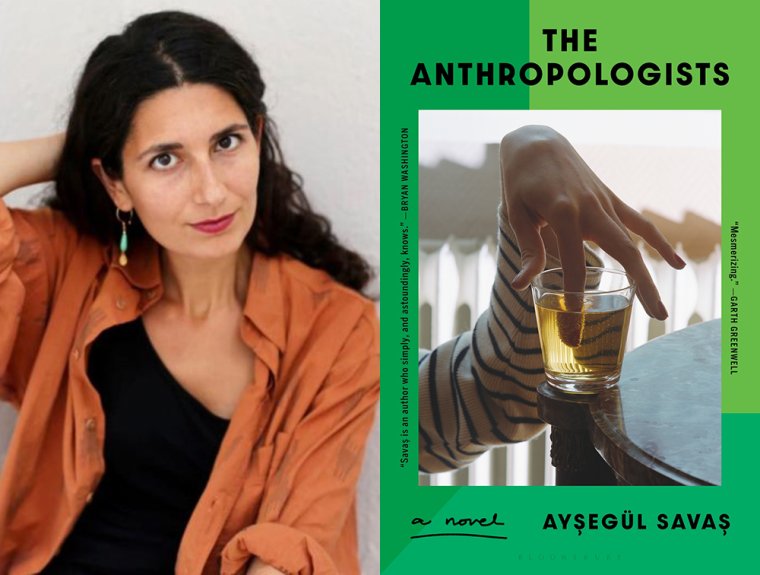This week’s installment of Ten Questions features Ayşegül Savaş, whose new novel, The Anthropologists, is out today from Bloomsbury. Less a narrative than a case study of romantic partnership in a world with increasingly nebulous borders, Savaş takes readers along on married couple Asya and Manu’s search to buy a home. Each from a different unidentified country, the two met during college in an unnamed city where they intend to settle. They visit various dwellings, where their contemplation of the pros and cons of each space gives way to a meditation on the many ways to build a life and their own hopes for the future. They meet friends along the way, speak with long-distance family members, and move through the daily rituals and conversations that form a couple’s private world. Publishers Weekly calls The Anthropologists “exceptional,” praising its “lucid prose” and dubbing its portrait of Asya and Manu “a masterpiece.” Ayşegül Savaş is the author of the novels Walking on the Ceiling (Riverhead Books, 2020) and White on White (Riverhead Books, 2022). Her work has been translated into six languages and has appeared in the New Yorker, the Paris Review, Granta, and elsewhere. She lives in Paris.

Ayşegül Savaş, author of The Anthropologists. (Credit: Maks Ovsjanikov)
1. How long did it take you to write The Anthropologists?
At the beginning of the pandemic, I wrote a short story in a single sitting about a young couple searching for an apartment to buy, in part inspired by many friends who were moving out of the city, changing apartments, trying to find new ways to live. In the two years that followed, I expanded the short story to include details of the couple’s daily lives. This was also a result of the pandemic: the way it made the simplest pleasures of a day, like going to a café, feel so valuable.
2. What was the most challenging thing about writing the book?
Honoring my initial vision to write about daily life without shadowing it with overt drama but nevertheless trying to find a way to make the book compelling.
3. Where, when, and how often do you write?
If I’m working on a book, I write five days a week, for a few hours in the morning. If I’m in between projects, I savor the fallow time of daydreaming, reading, and waiting for a new idea to emerge.
4. What are you reading right now?
The anthropologist Hugh Raffles’s heart- and mind-bending exploration of time, grief, and rocks: The Book of Unconformities: Speculations on Lost Time.
5. Which author or authors have been influential for you, in your writing of this book in particular or as a writer in general?
While writing The Anthropologists I often turned to the works of Tove Jansson: Her episodic novels, such as The Summer Book or Fair Play, are joyful, wicked, and serious studies of the textures of life and making art.
6. What is one thing that surprised you during the writing of The Anthropologists?
That I was writing a happy book!
7. What is one thing your agent or editor told you during the process of publishing this book that stuck with you?
My agent, Sarah Bowlin, suggested changing the title of the novel from Anthropology (too much like a text book!) to The Anthropologists. I think that her suggestion offers a very interesting way to engage with the book: The anthropologists are Asya and Manu, but also the readers. The small sections of the book are meant to be read as an ethnographic examination of the couple’s lives.
8. If you could go back in time and talk to the earlier you, before you started The Anthropologists, what would you say?
I would tell myself to trust the shape of the work and to follow it to the end. But then again, I would probably still feel all the doubt and confusion one feels when writing a novel, no matter the amount of good advice. It seems like a necessary step to figure out how to emerge from mess to order.
9. What forms of work, other than writing, did you have to do to complete this book?
During the time I was working on the first and second drafts of this book, I would ask friends about the secular rituals of their lives. I was moved by the many poetic answers they gave, the meaning they folded into daily acts, such as making morning coffee, watching a TV show, or going out for pizza on a Friday night.
10. What’s the best piece of writing advice you’ve ever received?
The best advice always comes from the lines of a novel or poem. And it’s always the same, though it comes in vastly different forms: that words, when written with sincerity and concentration, have the ability to reach their readers and move them towards beauty and deeper feeling.







